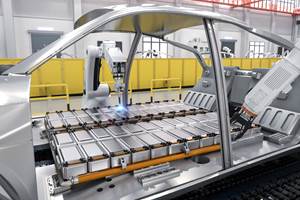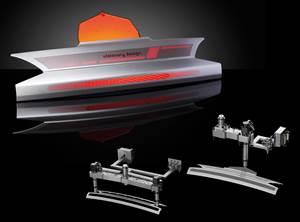Tooling, Tariffs and Reinventing One's Business for the "New Normal"
Mold industry professionals attending the Makino Technology Expo learned they must prepare for the “new normal” and build a better marketing and sales plan.
Attendees of the recent Makino Technology Expo got an earful of data, advice and tips from Laurie Harbour, president of Harbour Results Inc., for weathering any impending “storms” that may affect the mold and tooling industries in the next year.
Harbour started off telling the roomful of moldmakers and related professionals that the Manufacturing Index was still strong, with a PMI (purchasing managers index) of 49.8. “Despite that, we are doing a good job of talking ourselves into a recession,” she says, explaining that consumer confidence has been lower due to recent tariffs that have affected mainly consumer products—electronics particularly (iPhones, computers, etc.)—and that may be fueling the overall lower confidence in purchasing.
She notes that GDP has come down but is still very stable. “When you look at consumers and investors refinancing, one of the things the media is saying is that we must be struggling because people are not able to pay their loans so they are refinancing, but the reality is that the interest rates are very low. If you bought a house at five percent, and the interest is now 2.5 percent, you want to refinance your house.” She asserts that the amount of loans gone bad is actually very low.
The Perfect Storm
“It’s true manufacturing has shrunk,” she told attendees. “But if you look back at the last recession, in 2007, the indices we were seeing were much lower than they are today. So do we think there will be an adjustment? Certainly there will be an adjustment, but the question should be how deep of an adjustment.”
Harbour reminded her audience that all of this is happening at a time when the automotive industry is also readjusting a little bit, “and so it is like a perfect storm,” she says, adding that she does not see the country going into another massive recession unless everyone talks us into one.
Tariffs and Trade: A Lot of Volatility
“If you look at tariffs and trade, there is a lot of volatility there,” Harbour says. From the beginning of the Trump administration forward there has been some impact made virtually every month by actions like the 301 tariff on Mexico, the 232 tariff on the automotive industry and so on, with the most uncertainty happening in the trade talks between the U.S. and China because of, she believes, much inconsistency in communications between the two manufacturing super powers, and that is making trade relations very difficult. “Trump campaigned on getting an actual trade agreement with China and it is important to him that he achieve this goal in order to get reelected,” she says. Brexit is also causing pain points with regard to trade with the EU, she says. “A lot of people here in this country don’t think Brexit has a big impact on our economy, but it’s huge for us because it is causing difficulties for Trump as he negotiates trade policy there.”
Harbour shares that in 2018, Trump came out and said that imports of cars and automotive parts was a threat to national security and Congress agreed that it was a threat to national security. “He has yet to make a decision or impose any kind of a tariff on autos but he has to make a decision by November. Because it has been declared a threat to national security he has unilateral authority to put a tariff on imported cars and parts,” she says, adding that she believes a tariff, if enacted, will send the U.S. further into a recession because “this will cause major problems in the automotive industry and major cost impact that will eliminate some of the car sales,” and auto industry OEMs like Honda, Toyota, Nissan, BMW, Volkswagen and Mercedes who import a lot of car components that are then assembled here, are going to feel it. “However, if Trump puts a tariff in place like 232, the new USMCA (United States-Mexico-Canada Agreement) will protect Mexico and Canada.
“The bottom line is that there is a lot going on at one time,” she continues. “There’s a lot going on with tariffs and trade issues; there’s a lot of economic discussion.
Tooling Industry 2019: Challenging
Harbour told attendees they have received many, many calls over the last nine months from tooling companies asking about how the year will wind up because things have been quite challenging. She revealed that data collected from a recently released quarterly survey showed that shops overall are busy again. “It’s not as busy as 2017, but we are seeing automotive programs on hold right now.”
Some takeaways from the survey data:
- In Q1 and Q2 of this year, saw a significant drop in utilization, the industry seemed to dry up, quoting slowed down. Programs got big holds put on them, among them one from Chrysler that would have required a large quantity of tools and molds.
- Q3 and Q4, things are starting to pick back up. Large shops are at 70 percent to 80 percent of capacity and shops that are under $10 million are hovering around 30 percent to 50 percent of capacity on average.
- The survey shows that already, 10 shops have filed bankruptcy since January and 20 more are “sitting on the bubble right now,” either because of programs on hold, losing a program or having no cash to run the business.
- Die cast die makers have a six-month leadtime over molds, so are seeing things picking up faster. “We tend to think mold shops will see things picking up about five or six months after that,” Harbour says.
- 2020 will see several launches back in the marketplace, she says. “I don’t believe we will ever see 2017 again, in terms of volume, because I think it was a real pain on the industry and I think things are going to level out more.
- Harbour says the last 12 months have been the most competitive the U.S. has been against China ever.
- Harbour Results is working closely with the American Mold Builders Association, which hired a lobbyist to help get the mold tariff put back on against China. That tariff was enacted in July 2018 and put a 25 percent tariff on molds imported from China, but was lifted in December 2018, because two Tier 1 OEMs claimed an exception saying there was not enough capacity in the U.S. to build all of their molds here, so they have to go to China. Today, there is no tariff on molds imported from china, but there is a 25 percent tariff on die cast dies being imported from China, which was enacted in October 2018.
- Demand for tooling has changed dramatically in the last eight to 10 months, particularly in automotive, and this is primarily due to a change in the business model for OEMs. They are now shifting their focus to investing in and producing electric vehicles and autonomous products.
- “Every new platform that will be launched in the next 10 years will have an electric vehicle variant.”
Future Forecast for Tooling
“I think launches are picking back up. We are hearing form shops that they are seeing more quoting activity and more opportunities for next year,” Harbour says. “Again, this is not every shop, but we are definitely seeing some movement.” When the industry dips, she warns, the under $10 million shops may win small, two to three mold packages but the big shops, which normally win 30-mold packages are not getting them, “so what do you think they are going after?” Harbour asks. “The big guys have the cash to buy that work out from under the smaller shops. They can afford to lower their price in order to keep their plants busy until the markets come back, leaving the little guys gasping for air.”
Other takeaways from Harbour’s presentation include:
- Price competitiveness is just the new norm. It’s not going away.
- China continues to “buy” work (often at no profit) but how long can it sustain this? Harbour says eventually, you strain your business for so long that you can no longer afford it. She questions how much the Chinese government is stepping in to help Chinese shops.
- Harbour believes that the mold tariff will be back on by the end of this year.
- She sees small shops suffering more fallout. “There has been something like 2,000 layoffs in Michigan alone, and a lot more in Windsor, too.”
- Pricing is going to remain tight, even if supply and demand shifts.
Future Business Readiness
Harbour says that even if everyone in the audience never purchases or drives an electric vehicle, it does not matter. “The reality is that the next generation that’s coming is way bigger than all of us baby boomers that are exiting the market over the next eight years, and this generation is going to pull us into technology; and we can’t stop this no matter how much we may want to,” she says. “The baby boomers don’t have buying power anymore, guys. We’re done. The millenials have it all. Do you realize the oldest millenials are now 39? These are not kids anymore.”
She says this is forcing a change in the automotive industry and it’s forcing a change in tooling. “I’m not telling you that tooling is going away, because the more the vehicles change the more we need tooling. What I am telling you is that we are not going to see another market like 2017 again. This market is going to change at a much more manageable level—something like $8-9 billion a year, and it is going to have peaks and valleys just like we have now.”
Harbour says she sees the biggest challenges shops have today in terms of future business readiness are not having a technology plan, a sales strategy or anyone who on staff who knows how to sell. Do they have a hiring plan? Many do not, and that means they are not ready for the future.
Tips for future business readiness (business strategy) that Harbour shared includes:
- By 2025, 75 percent of the workforce will be made up of millenials and Gen Z’s.
- GlassDoor.com is the number one site for recruiting from this population. On this site, your current employees rate your business. Harbour says millenials and Gen Z’s, based on a survey conducted, want a minimum of seven reviews about a company before they will even form an opinion about it. “What do you think they do when you call and ask them to come in for an interview? They look you up online.”
- Websites and your image online matter. What does it look like and how is that branding your company? It is critical to growing your company, not just from a hiring standpoint but from a sales standpoint.
- Social media – a show of hands in the room saw only four out of about 50 attendees use it regularly. Young people don’t look at Facebook (that’s for old people), but they do look at LinkedIn, Twitter, Snapchat, Instagram. “You have to be active on there.”
“You can’t stop reinvesting in your business or you will fall behind,” she concludes.
Related Content
Industry Report: Automotive Outlook, Forecast, Disruptions and Industry Transitions
A recent presentation by Auto Forecast Solutions shares some interesting trends to help those who work within the automotive industry better understand key trends.
Read MoreHarbour Results, AutoForecast Solutions Release Battery-Electric Vehicle Market Study
The study analyzes the transition from an industry dominated by the internal combustion engine to battery-electric mobility and its impact on the supply chain, which will have ripple effects from automakers to tool and die shops.
Read MoreHot Runner Technologies Advance Quality Surface Requirements in Automotive
Oerlikon HRSflow hot runner systems combine cost-efficient production with a precise process control for a variety of automotive applications.
Read MoreMold Innovations Power Unique Auto Lighting Elements on Hummer EVs
Diamond machining, electroforming of micro-optical inserts and modified latch-lock system help injection molds produce unique forward lighting elements.
Read MoreRead Next
How to Use Continuing Education to Remain Competitive in Moldmaking
Continued training helps moldmakers make tooling decisions and properly use the latest cutting tool to efficiently machine high-quality molds.
Read MoreHow to Use Strategic Planning Tools, Data to Manage the Human Side of Business
Q&A with Marion Wells, MMT EAB member and founder of Human Asset Management.
Read MoreAre You a Moldmaker Considering 3D Printing? Consider the 3D Printing Workshop at NPE2024
Presentations will cover 3D printing for mold tooling, material innovation, product development, bridge production and full-scale, high-volume additive manufacturing.
Read More





















